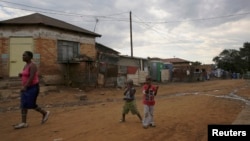South Africa is suffering from worsening electricity blackouts as state-run utility Eskom falls deeper into crisis. Eskom, which provides South Africa with 95 percent of its electricity, says it will suffer a massive $21 billion funding shortfall over the next four years. The government has promised to bailout Eskom with a partial privatization program - which is likely to result in a fierce backlash from political opponents and trade unions. The ruling African National Congress will have to balance its responsibility to rescue the biggest threat to its economy while limiting political damage.
Blackouts, power outages
Years of poor maintenance, non-cost effective tariffs and under-investment have come back to bite South Africa. That is the assessment of Eskom's Chief Executive Tshediso Matona who announced this month that regular power outages are likely to continue for the next year and a half.
Eskom is highly monopolistic - controlling power generation, transmission and distribution. In developed markets this is not usually the case, with various private and government sectors sharing the load.
Natasha Michaels, the opposition Democratic Alliance’s shadow minister of public enterprises, says Eskom has had its day. “The reason we are in the crisis we are in right now is due to Eskom having such a complete and total monopoly around the energy production and energy distribution in the country," she states, "I think now, more than ever, it has become apparent that this has been a very unhealthy relationship.”
Bailout, privatization
The ruling African National Congress (ANC) plans a $1.8 billion bailout and to sell $2 billion of “non-strategic assets” to help bridge Eskom’s $21 billion funding shortfall. But that may be interpreted as privatization.
Power privatization has been discussed at length over the past decade but the ruling ANC’s traditional allies - the Communist Party and powerful trade unions - oppose it ideologically as does the far-left opposition party, the Economic Freedom Front.
So Eskom’s detractors are now pushing to see the Independent Services and Market Operator (ISMO) bill, signed into law. ISMO would reduce Eskom’s stranglehold over the energy sector by removing the transmission grid from Eskom and placing it in an independent entity that would foster competition.
Shaun Nel, spokesman for the Energy Intensive Users Group, says the introduction of private independent power producers - or IPPs - is a good political compromise.
“Privatization of Eskom is not ideologically palatable but the use of IPPs is something which, while has been problematic in the past, they have come to realize that they cannot afford the South African balance sheet to maintain that level of investment," says Nel. "IPPs I don't think are unpalatable but the break up of Eskom and the privatization of Eskom definitely is.”
Power supply was not always this bad.
There was a surplus of electricity in the 1980s which prompted South Africa to engage with energy-hungry mining, processing and construction industries and the commodity boom became the main driver of South Africa’s economic growth.
At the turn of democracy in 1994, South Africa boasted an abundant supply of the world’s cheapest electricity.
Today, Eskom is in a “financial hole,” says energy expert, Chris Yelland, who says diversifying energy sources is the only lasting answer.
“Ideologically, the government is kind of hamstrung to its partnership with labor and partnership with the South African Communist Party. I personally believe that Eskom should contemplate selling Eskom assets in order to diversify the electricity sector of South Africa and raise the money in that way. Ideologically, it appears almost impossible that would happen," Eskom says, "The economy is going to suffer from a failing electricity sector so in a way, money is the final deciding factor…money will trump ideology ultimately.”
In the face of sluggish economic growth and rolling blackouts, the ANC’s decision to sell government assets will mark a stark shift in policy and the political implications may be as uncertain as the nation’s power supply.




